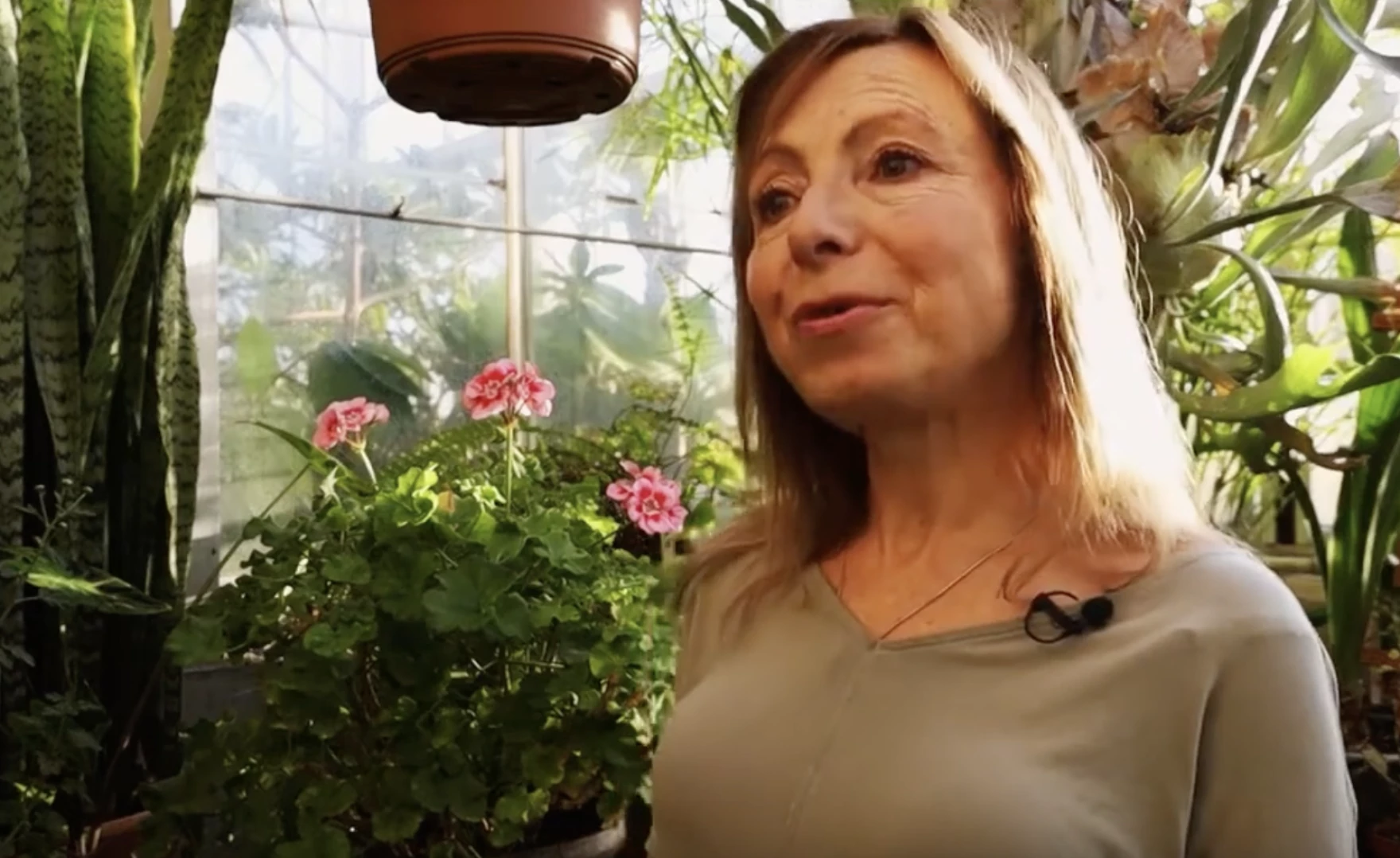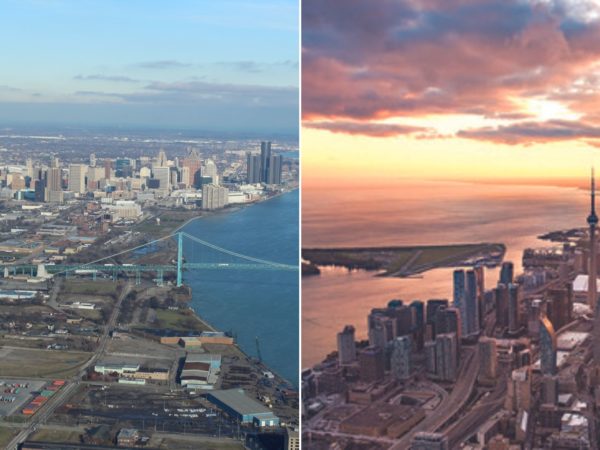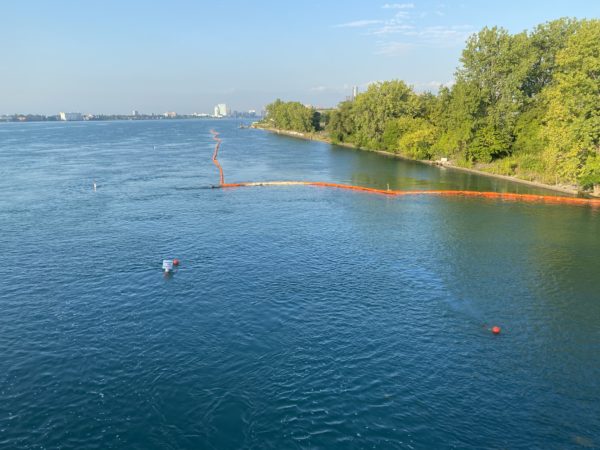
By Izzy Ross, Interlochen Public Radio
This coverage is made possible through a partnership with IPR and Grist, a nonprofit independent media organization dedicated to telling stories of climate solutions and a just future.
The beginning of “Climate Sisu” is familiar — footage of trash floating in the ocean, aerial views of dry earth, and heat maps of carbon dioxide in the atmosphere.
We’ve seen those images many times in documentaries and news stories about climate change.
But this short film is unique in its focus on climate resilience in northern Michigan.
Sisu is a Finnish word that describes the concept of resilience. The solutions the documentary features range from planting new grape varietals in vineyards to pushing for passenger train service to northwest Michigan to adapting city planning in the Upper Peninsula to prepare for environmental shifts.
“We’re almost on the scavenger hunt, led by these young people,” said Grand Valley State University Prof. Elena Lioubimtseva, who helped write and produce the film, which was released last spring. “We’re going north, we’re exploring, we’re looking for solutions. We’re open, we want to learn from the community about what is already done. We don’t want to fall into despair, which is, unfortunately, really becoming the prevailing theme when we speak about climate change.”
Lioubimtseva is a professor of geography and sustainable planning at Grand Valley State University. She started teaching courses on climate change in 2000.
“I remember at that time, it still was seen as something politically dangerous,” she said. “I was introducing my class on global climate change, and people were saying, ‘Oh, you don’t want to call it global environmental change.’”
“Climate Sisu” has its roots in an education project Lioubimtseva started in 2020, when she was creating online resources for teachers, funded by a grant from NASA. When the pandemic hit, she and other teachers continued to develop those virtual lesson plans and tools. They focused on different themes, like climate change in Michigan and environmental justice.
Still, Lioubimtseva had questions: “Can students really be passionate about it, can they really relate to the topic of climate change if they’re not experienced in outdoor education?”
As the pandemic continued, she started taking her students outside virtually, going out in the field while she held Zoom classes. She started brainstorming with two students, Leah Anderson and Kristin Davis. By 2022, they had a collection of short videos, and decided to make a one-hour feature.
The documentary touches on a wide array of local and grassroots approaches to climate change — from education, to city planning, to agriculture.
The first stop is Suttons Bay, where the nonprofit Inland Seas Education Association provides environmental education from sailboats.
The team visited Brengman Brothers Vineyard in Traverse City, where the owners started planting new types of grapes as the growing season has gotten longer.
People from Groundwork, an environmental nonprofit, advocate for a passenger train system in the documentary and talk about the controversial Line 5 pipeline and a proposed tunnel project that would run under the Straits of Mackinac — something the group opposes.
A planner for the City of Marquette talks about the need to adapt city plans and get community buy-in.
A professor at Northern Michigan University’s Center for Native American Studies talked about the importance of recognizing our relationships and responsibilities to the earth when thinking about climate change.
A climate educator and a business professor weigh in as well.
Lioubimtseva said they also wanted the audience to think about Michigan’s place in the world; while it might be better-situated and experience less drastic shifts than places like Florida or California, it still has a responsibility to mitigate climate change.
The best way to do that is by cutting greenhouse gasses. And the need to do so is urgent.
“We want to be optimistic, and it’s important to be solution oriented,” she said. “But it’s also important to convey that sense of urgency, that we cannot just wait and see and act slowly. We cannot afford to be idle.”
A clear takeaway from “Climate Sisu” is that working together is important. And climate action has to be sustained on many levels.
“I think individual action is important,” Lioubimtseva said, “but it cannot be successful without support of national policies, state policies, local policies.”
Climate Sisu will be screened at the Dennos Museum in Traverse City on Nov. 30 from 6:30 – 8:30 p.m. The event will begin with a panel discussion featuring experts who will share information and local resources.
• John Lutchko, programs manager for Great Lakes Water Studies Institute, Northwestern Michigan College, moderator
• Elena Lioubimtseva, professor of geography and sustainable planning, creator of “Climate Sisu” and co-founder of the GVSU Climate Change Education Solutions Network
• Jim MacInnes, chairman, Crystal Mountain
• Ashley Rudzinski, climate and environment program director, Groundwork Center for Resilient Communities
• Trisha Smrecak, education coordinator, Inland Seas Education Association
This event is free, but registration is required.
Read the full transcript of the interview here.
ELENA LIOUBIMTSEVA, Grand Valley State University professor: As a parent, and as an educator, I really increasingly worry about the way we speak about climate change to younger people. And I think that generation of our children and generation of our students is really disproportionately affected by this burden of climate anxiety. You know, there’s this very strong feeling that our generation has dumped climate change on them, and they need to figure out what to do. And this is absolutely unfair.
It’s a dialogue, essentially: What are we going to do about climate change?
We’re almost on the scavenger hunt, led by these young people, you know. We are going north, we are exploring, we are looking for solutions, we’re open, we want to learn from the community about what is already done. And we don’t want to fall in this doom and gloom, and we don’t want to fall into despair, which is, unfortunately, really becoming the prevailing theme when we speak about climate change.
So we really wanted to step back and say, ‘Hey, look, wait a minute, there are so many solutions.’
IZZY ROSS, IPR News: Were there any ones that you were surprised by? Or that you really thought, wow, this is an amazing idea moving forward?
LIOUBIMTSEVA: I don’t think it is appropriate to speak about one particular solution as a silver bullet, because obviously, there is no silver bullet for climate change. It’s a combination of various place-based solutions. We need a combination of them all.
AUDIO CLIP FROM CLIMATE SISU TRAILER
What we also wanted the audience to think about: Michigan has amazing opportunities. It also has a huge responsibility to the rest of the world and to the rest of the nation.
At this point, Michigan, probably to some extent, is even benefiting from climate change. We do have responsibility to mitigate it, even though we are not experiencing those drastic, negative impacts of climate change, like California, like Florida, you know, like Bangladesh, like Congo and so on.
ROSS: As a local journalist, I often come up against the question of the importance of local or individual efforts. I was thinking about this when you mentioned that there’s no silver bullet. What did you find working on this project?
LIOUBIMTSEVA: I think that regardless where we live, there is no question that the number one priority is just going away from fossil fuels as soon as possible. There is absolutely no questions about it.
But I think with all the best case scenarios for climate change mitigation, we still need work on climate change adaptation. Those are decisions that need to happen on all levels. So I think individual action is important, but it cannot be successful without support of national policies, state policies, local policies.
ROSS: One of the final messages of the documentary is that hearing about other people’s efforts on climate change can help make working in climate action feel less lonely. Is that the case for you? And what has the feedback been from other people?
LIOUBIMTSEVA: Well, absolutely. I think that this is the reason why I’m teaching rather than just doing research. I think we all feel much better when we are connected with other people who are working for the same goal.
And I would emphasize the importance of collective action, both for the purpose of success of the action itself – there is no question that when we work together, we achieve much better results – but I think it also has many psychological benefits. Our narrator Leah is showing at the end how the journey of climate activists is becoming much more inspiring and much happier when we work as a community.
Catch more news at Great Lakes Now:
As Great Lakes warm, collaboration and Indigenous self-determination are keys to adapting
How climate change can confuse fall foliage
Featured image: Elena Lioubimtseva, a Grand Valley State University professor of geography and sustainable planning, speaks during the documentary “Climate Sisu,” which she helped create. (Photo: Screenshot from GVSU’s “Climate Sisu”)





